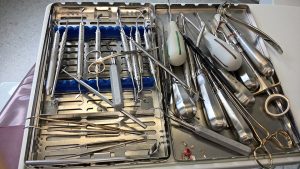
One of the reasons why people choose a career in dental assisting is that it can provide a good income.
We would like to mention that if you wish to earn even more you have to be ready to take more responsibilities in a dental office and meet some additional requirements.
You will have to become an expanded function dental assistant who is in charge of both the typical duties of a dental assistant, such as making patients feel comfortable and assisting dentists, as well as expanded functions, taking X-rays, applying sealants, doing coronal polishing and much more.
Page Navigation
What is the Expanded Functions Dental Assistant?
An expanded functions dental assistant, or EFDA, is a dental assistant who is well equipped with additional skills, thus assigned extra responsibilities and duties.
So as to be able to successfully perform these duties, they have to pass through training and get additional licenses or certifications than dental assistants.
Their duties include procedures such as coronal polishing, taking impressions, or applying sealants or topical anesthetic and what exactly these assistants are allowed to do depends on the state in which they work.
Do not get confused if you are an EFDA, and you are assigned to perform those duties of a typical dental assistant as well.
What kind of duties you will have depends on the size of the facility you work in.
If you are employed as an EFDA in a smaller dental office, you will be responsible for all the dental assistant duties as well as their expanded functions.
However, in larger offices that have many employees, an EFDA is responsible only for the extra duties, while dental assistants without a certification perform simpler tasks.
Just like the duties of a dental assistant, the exact duties of an EFDA may vary by state, but we would like to mention the typical responsibilities including the following:
- Guiding patients to the chair
- Communicating with patients so as to make sure they are comfortable and ready for the appointment
- Educating them about good oral hygiene and the dentist’s instructions
- Preparing rooms for appointments
- Sterilizing instruments
- Assisting a dentist by handing instruments during a procedure
- Using the suction hose to keep the patient’s mouth dry
- Maintaining and organizing patient records
- Taking phone calls and scheduling appointments
- Communicating with patients about billing and making payments
As it is already mentioned, the expanded functions of EFDAs vary by each state’s dentistry board.
Here is a list of the expanded functions that are EFDAs are allowed to perform some of the states:
- Radiography – taking and exposing patient X-rays
- Sealants application – applying a thin layer of plastic on teeth to seal them and prevent cavities
- Fluoride application – applying fluoride gel to the teeth for cavity prevention
- Topical anesthetic – numbing an area of a patient’s mouth using a local, topical application, not an injection
- Coronal polishing – buffing away small, soft plaque deposits from the teeth for additional cleaning
- Gas monitoring – monitoring a patient under nitrous oxide
- Dental charting – creating a chart that lists and describes the condition of a patient’s teeth
- Suture removal – taking out stitches following a surgical dental procedure
- Crown application – putting in a dental crown, temporary only
- Dental impressions – taking a mold of a patient’s teeth for creating retainers, mouth guards, crowns, bridges, dentures, or veneers
According to the ADA, the expanded function that EFDAs are allowed to perform in dental offices is radiography and it is estimated that more than 90 percent of EFDAs perform radiography and X-ray tasks.
Also, they are in charge of coronal polishing, monitoring the use of nitrous oxide, and applying sealant.
In some states, there is an additional level of licensing for those EFDAs who would like to work with orthodontists.
Their duties are very similar to regular dental assistants, but they are performed in an orthodontics setting and procedures, such as fitting braces.
How Do I Become an Expanded Functions Dental Assistant?
Again, ways of becoming expanded dental assistants are various and they also depend on the state in which you will work.
An EFDA is officially called a certified dental assistant, a licensed dental assistant, registered dental assistant, or a registered dental assistant with expanded functions, but no matter which title is used are distinct from that of a dental assistant.
There are states that have several levels of dental assisting and licensing.
If we take California as an example, it has defined different roles and licensing requirements for dental assistant, registered dental assistant, registered dental assistant in extended functions, orthodontic assistant, and oral surgery/periodontal practice.
So, those of you who would like to become EFDAs should find out what they need to do to meet the requirements in the state where they live and plan to work.
All information can be gained if you contact your state’s dental board or check with the Dental Assisting National Board (DANB).
Education Requirements
Even though the requirements for becoming an EFDA vary by state, there are some similarities for all of the states.
You will be required to begin your educational path towards this new career by earning a degree, certificate, or diploma from an appropriate dental assisting program and school.
In the majority of states, the program that you are supposed to complete should be accredited by the Commission on Dental Accreditation (CODA).
Also, the program that is considered appropriate should meet all the requirements of its dental board and include expanded functions courses but does not have to be accredited.
We suggest that getting an associate’s degree or a certificate in dental assisting should be your first step.
Not only will you be equipped with excellent knowledge through an accredited program, but also you will go through coursework that will include additional topics like oral anatomy, dental materials, radiography, clinical procedures, and operative techniques.
If you are wondering how long you will need to attend education, we would like to mention that most academic programs for dental assisting last between one and two years, depending on the level you want to reach.
A certificate program is one year long, while associate degree programs take two years and include about 100 credit hours.
Examinations for Certification
Once you enroll in an accredited academic program, you do not have to worry about reaching a certificate after finishing it, as you will be well prepared to successfully complete any required exams.
To get a certificate, states set a requirement that each dental assistant has to pass either a specific exam or a few appropriate exams that test his/her dental and clinical knowledge.
The DANB’s Certified Dental Assistant (CDA) exam is the one commonly accepted.
After passing this test, you will earn the CDA certification, as proof of your skills and knowledge to work as an EFDA in most states.
Furthermore, there are states that have their own exam that has to be passed.
The CDA exam costs $425 to take and only those who meet the eligibility requirements are allowed to take it.
So as to become eligible, you can choose one of the following three pathways:
- Complete a CODA-accredited dental assisting program and have CPR certification
- Graduate from high school or hold a GED, have 3,500 hours of work experience, and hold CPR certification
- Have an expired CDA certification or a dental degree and be certified in CPR
Applying for State Licensing
If you managed to complete your education and passed all the required exams, you have the right to apply to your state’s dental board for licensing, certification, or registration.
Now, do not get worried if you are asked to complete a few additional requirements at this moment including having fingerprints made and passing a criminal background check or a drug test.
The requirements of some states include providing proof that you completed a course in specific areas of dental assisting expanded functions, such as a radiography course before you will be allowed to take X-rays.
Also, you may be asked to earn a certificate in using nitrous oxide if you want to work with patients monitoring the use of this gas.
To get your license or certification, you will have to complete and submit an application to the dental board with proof of your education and exam scores, a clean background check, and all the information needed.
In some states, you will be required to submit letters of recommendation with the application, which can be written by your former instructors, dentists you have worked with, or other employers.
Last but not the least, there are some states which require the payment of fees to apply for licensing.
How Much Do EFDAs Earn?
The U.S. Bureau of Labor Statistics (BLS) shows that the median salary for a dental assistant is approximately $38,660 per year and $18.59 per hour.
The important thing to mention is that these numbers include all dental assistants.
So, those who are not certified cannot expect to earn as much as EFDAs, so the BLS also reports that the dental assistants with the highest level of education and experience make more than $54,800 per year.
According to the DANB reports, dental assistants with the CDA certification, which also includes many EFDAs, earn $20.76 per hour on average.
The salary will also vary by state, but in all states, as the BLS reports, expected career growth is strong for all dental assistants.
In the years to come, the number of new dental assisting jobs is expected to grow, meaning that future dental assistants should not find it difficult to get their first job.
Plus, as an EFDA, you can expect excellent job security.
How Can I Find EFDA Classes Near Me?
The first thing you should do is to make sure whether your state requires that you take your classes through a CODA-accredited program.
The majority of states require this, or they demand that the program is comparable to one accredited by CODA.
This means that you can start your search with these programs and to make it easier for people to find what they are looking for, the ADA website offered a search tool that enables you to search by state, program type, and even city.
Finding an accredited program near you can be difficult so you should check with the community colleges in your area to provide you with more information.
We know that sometimes it is easier to enroll in a non-accredited program which is in your city, but we suggest that you check with your state dental board to make sure whether they will accept the specific program for your licensing or certification.
Now is the perfect moment to become an expanded function dental assistant, due to the fact that all healthcare careers are growing.
What is even better, this is a career field that does not require the completion of a four-year college degree or years of training.
If you want to begin working as soon as possible and have a career that allows you to work and with patients, you should start working toward your goal of becoming an EFDA.








